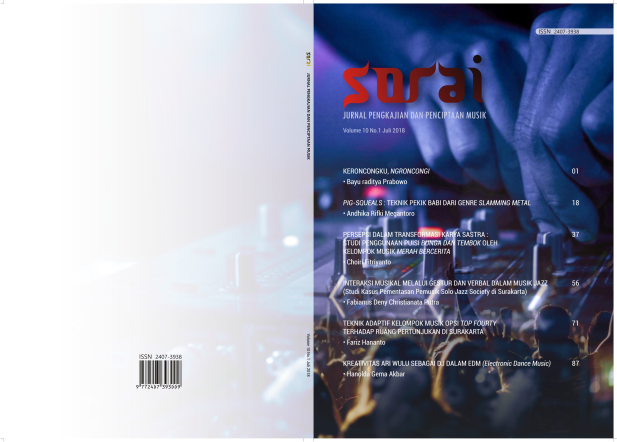PERSEPSI DALAM TRANSFORMASI KARYA SASTRA : STUDI PENGGUNAAN PUISI BUNGA DAN TEMBOK OLEH KELOMPOK MUSIK MERAH BERCERITA
Main Article Content
Abstract
ABSTRACT
Â
This paper attempts to describe how the Merah Bercerita music group builds the perception of Wiji Thukul's poem entitled "Flower and Wall" and pours it into a song. It is noteworthy that this musical work is not merely showing the phenomenon of mere musical performances, but also is an effort in giving musical power to the poetic text that is full of social criticism. In this qualitative research, data collection is done with emphasis on the concept of perception as the main perspective, then the data is interpreted to be analysed. The conclusion of this research is the existence of three stages in the process of perception conducted by Merah Bercerita group, namely (1) sensation, (2) attention, and (3) interpretation.
Â
Kata Kunci : persepsi, puisi, musik, bentuk musik
Downloads
Article Details

This work is licensed under a Creative Commons Attribution-ShareAlike 4.0 International License.
Copyright
Authors who publish to Sorai: Jurnal Pengkajian dan Penciptaan Musik agrees to the following terms:
- Authors retain copyright and grant the journal right of first publication with the work simultaneously licensed under a Creative Commons Attribution License (CC BY-SA 4.0) that allows others to share the work with an acknowledgment of the work's authorship and initial publication in this journal.
- Authors can enter into separate, additional contractual arrangements for the non-exclusive distribution of the journal's published version of the work (e.g., post it to an institutional repository or edit it in a book), with an acknowledgment of its initial publication in this journal.
- Authors are permitted and encouraged to post their work online (e.g., in institutional repositories or on their website) before and during the submission process, as it can lead to productive exchanges, as well as earlier and greater citation of published work.
References
Arini, Sri Hermawati Dwi. 2008. Seni Budaya Jilid 1 untuk SMK. Jakarta: Direktorat Pembinaan SMK, Direktorat Jenderal Manajemen Pendidikan Dasar dan Menengah, Departemen Pendidikan Nasional.
Damono, Sapardi Djoko. 2002. Sosiologi Sastra: Sebuah Pengantar Ringkas. Jakarta: Pusat Pengembangan Bahasa, Departemen Pendidikan dan Kebudayaan.
Indrawijaya, Adam. 1989. Perilaku Organisasi. Bandung: Sinar Baru.
Jazuli, M. 2008. Paradigma Kontekstual Pendidikan Seni. Semarang: Unesa Semarang.
Kleden, Leo. 1994. “Tanda Zaman, T e g a n g a n B u d a y a d a n T r a n s f o r m a s i †. L a p o r a n Pelaksanaan Temu Ilmiah dan Festival MSPI '94 Tanggal 1-3 Desember 1994 di Maumere Flores. Surakarta: MSPI.
K u n t o w i j o y o . 1 9 8 7 . B u d a y a d a n Masyarakat. Yogyakarta: Tiara Wacana.
Liliweri, Alo. 2003. Makna Budaya dalam K o m u n i k a s i A n t a r B u d a y a . Yogyakarta: LKiS.
Miller, Hugh M. 2001. Apresiasi Musik, terj. Triyono Bramantyo. Yogyakarta: Yayasan Lentera Budaya.
Mulyana, Deddy. 2006. Metodelogi Penelitian: Paradigma Baru Ilmu Komunikasi dan Ilmu Sosial Lainnya. Bandung: Rosda Karya.
Nakagawa, Shin. 2000. Musik dan Kosmos, Sebuah Pengantar Etnomusikologi. Jakarta: Yayasan Obor.
Rachmawati, Yeni. 2005. Musik Sebagai Pembentuk Budi Pekerti, Sebuah P a n d u a n u n t u k P e n d i d i k a n . Yogyakarta: Panduan.
Rakhmat, Jalaludin. 2003. Psikologi Komunikasi. Bandung: Rosdakarya.
Sanjaya, Bima Agung. “Makna Kritik Sosial Dalam Lirik Lagu â€Bento†Karya Iwan Fals (Analisis Semiotika Roland Barthes)†dalam eJournal Ilmu Komunikasi, Volume 1, Nomor 4, 2013: 183 – 199.
Soeharto, M. 1992. Kamus Musik. Jakarta:Gramedia.
Suryajaya, Martin. 2009. Imanensi dan Tr a n s en d en s i . J a k a r t a : A k s i Sepihak.
Sutrisno dkk. 2005. Teks-Teks Kunci Estetika Filsafat Seni. Yogyakarta: Galang Press.
Teeuw & Awe. 2003. Sastra dan Ilmu Sastra. Jakarta: Dunia Pustaka Jaya.
Narasumber
a. Fajar Merah, 24 tahun. Penyanyi pada kelompok musik Merah Bercerita.
b. Yanuar Arifin, 22 tahun. Pemain gitar bas pada kelompok musik Merah Bercerita.
c. Gandhiasta Andarajati, 23 tahun. Mantan pemain gitar pada kelompok musik Merah
Bercerita.
d. Misael Lintang Bumi, 20 tahun. Pemain drum pada kelompok musik Merah Bercerita.
